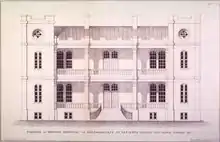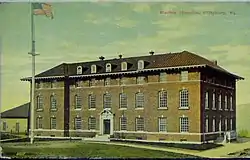Two buildings in Pittsburgh were known as the United States Marine Hospital. They were part of the U.S. Marine Hospital system, which was run by the Marine Hospital Service and its successor the Public Health Service, primarily for the benefit of the civilian merchant marine. The original hospital was located in Allegheny City and was used as a Marine Hospital during 1851–1875, after which it was sold. It was demolished in the late 1880s for construction of the Ohio Connecting Railroad Bridge.
The replacement opened in 1909 on part of the land previously occupied by the Allegheny Arsenal. It was the first home of the Office of Industrial Hygiene and Sanitation, the earliest predecessor of the National Institute for Occupational Safety and Health, during 1915–1918. It operated as a hospital until 1949, and then became the Allegheny County Health Department's headquarters, now named the Frank B. Clack Health Center. It became a contributing property to the newly created Lawrenceville Historic District in 2019.
First hospital

| U.S. Marine Hospital (Pittsburgh) | |
|---|---|
| General information | |
| Coordinates | 40°27′59″N 80°02′16″W / 40.4663°N 80.0378°W |
| Completed | 1851 |
| Demolished | 1880s |
In the early 19th century, the first Marine Hospitals were established along the East Coast of the United States. An 1837 report recommended sites for an expansion of the system to what was then considered the "western waters", mainly the Mississippi River and Ohio River. The report recommended that a Marine Hospital be placed in Wheeling, Virginia (now in West Virginia), but this site was changed to Pittsburgh before construction.[1] U.S. Representative Moses Hampton was said to be instrumental in having the hospital sited in Pittsburgh.[2]
The Pittsburgh hospital was authorized in 1840 and constructed during 1846–1851. The building layout was based on the then-standard Marine Hospital plan by Robert Mills and Thomas Lawson.[1] It was located downstream of Allegheny City.[3]
In 1871, the Marine Hospital Service was created within the Department of the Treasury to centralize management of the system. In its first report, it recommended that the Pittsburgh hospital be disposed of and replaced due to its dilapidated state and unhealthy location between a blast furnace and an iron rolling mill.[1][3]
An initial auction sale was rejected by Treasury officials due to the price being too low. The building and grounds were successfully sold to liquor merchant J. H. Hespenheide on April 19, 1875 for $33,000[4] and then used as a saloon.[5] The building was shown on maps as late as 1886.[6] By 1890 it had been demolished for construction of the northeastern approach of the Ohio Connecting Railroad Bridge.[5]
Second hospital
U.S. Marine Hospital (Pittsburgh) Frank B. Clack Health Center | |
 Early 20th century postcard depicting the hospital | |
| Coordinates | 40°27′55″N 79°57′32″W / 40.4654°N 79.9590°W |
|---|---|
| Built | 1909 |
| Part of | Lawrenceville Historic District (ID100004020) |
Marine Hospital
Although funds raised from the 1875 sale were supposed to be used to erect a new hospital, this did not happen in a timely manner. Mercy Hospital was contracted to provide hospital services to rivermen in the interim. By the 1890s, rivermen were actively lobbying for the construction of a new Marine Hospital.[7]
Funding for the second hospital was approved by Congress on March 31, 1902.[8] It was built on five acres that were part of land previously occupied by the Allegheny Arsenal. The land was transferred in 1904 and the building constructed during 1908–1909. It is a brick Classical Revival building 9 bays wide and 3.5 stories high.[9]
In 1915, the Pittsburgh Marine Hospital became the first home of the Office of Industrial Hygiene and Sanitation, which would eventually become the National Institute for Occupational Safety and Health.[10] Laboratories for chemistry, physiology, and bacteriology were constructed on the building's second floor, and a physical laboratory on the ground floor, all in the northwest wing of the building.[11][12] It was the first laboratory for scientific investigation of occupational health in the United States.[13] Its location was in proximity to the recently established Bruceton Research Center of the U.S. Bureau of Mines, enhancing cooperation on miners' health.[14][15] In 1918, the Office relocated to Washington, D.C.[10]
By 1921, the complex had five buildings.[16] John McGraw, later a brigadier general in the United States Air Force, served a junior internship at the hospital during 1933–1934.[17]
Local health center

The Marine Hospital ceased operating in 1949.[1][18] In 1950, it was leased to the City of Pittsburgh, and in 1956 ownership was transferred outright. It became known as the Arsenal Health Center.[19][20] In the 1950s the facility was the site of a research nursery school directed by Benjamin Spock.[21][22]
It eventually became home to the Allegheny County Health Department's headquarters.[9][23] In 1979, it was renamed the Frank B. Clack Health Center. Clack had been Director of the Allegheny County Health Department during 1970–1979.[24]
In 2004, the Young Preservationists Association of Pittsburgh named the building one of the area's top ten historic preservation opportunities in the area. At the time, the former hospital was part of a seven-building complex with a green lawn and garden-like setting.[23]
In 2018, the Allegheny County Health Department used money from its Clean Air Fund to renovate the former hospital building for a new air quality program headquarters.[25][26][27][28] In 2019, it became a contributing property to the newly created Lawrenceville Historic District.[9][29]
References
- 1 2 3 4 "National Historic Landmark Nomination: United States Marine Hospital, Louisville, Kentucky". pp. 12–13, 19, 28. Retrieved 2021-03-04.
- ↑ Lambing, A. A.; White, J. W. F. (1888). "Allegheny County: its early history and subsequent development". p. 114. Retrieved 2021-03-05 – via Digital Pitt.
- 1 2 Annual report of the Supervising Surgeon-General of the Marine Hospital Service of the United States. U.S. Government Printing Office. 1872. p. 13.
- ↑ "The Marine Hospital sold". Pittsburgh Daily Post. 1875-04-20. p. 4. Retrieved 2021-03-05.
- 1 2 "The big span on its piers". Pittsburgh Daily Post. 1890-08-20. p. 2. Retrieved 2021-03-05.
- ↑ "Allegheny City". G. M. Hopkins & Co. 1886. Marked "Hersberger" on map. Retrieved 2021-03-05 – via Historic Pittsburgh.
- ↑ "Want a Hospital". Pittsburgh Post-Gazette. 1899-08-25. p. 8. Retrieved 2021-03-05.
- ↑ "An Act For a public building for a marine hospital at Pittsburg, Pennsylvania" (PDF). U.S. Library of Congress. 1902-03-31. Retrieved 2021-03-04.
- 1 2 3 "National Register of Historic Places Registration Form: Lawrenceville Historic District" (PDF). pp. 7/7, 8/29, 8/37, 118. Retrieved 2021-03-04.
- 1 2 The President's Report on Occupational Safety and Health. Commerce Clearing House. 1972. pp. 153–154.
- ↑ "Aim is to study occupational diseases". Pittsburgh Post-Gazette. 1915-07-26. p. 10. Retrieved 2021-03-06.
- ↑ "Hospital to open four laboratories". Pittsburgh Daily Post. 1915-11-12. p. 7. Retrieved 2021-03-06.
- ↑ "The danger of having a job". Pittsburgh Daily Post. 1915-11-21. p. 12. Retrieved 2021-03-06.
- ↑ Breslin, John A. (2010-02-01). "One Hundred Years of Federal Mining Safety and Health Research". U.S. National Institute for Occupational Safety and Health. p. 32. Retrieved 2019-12-30.
- ↑ Doyle, Henry N. (1975). The federal industrial hygiene agency: a history of the Division of Occupational Health, United States Public Health Service. American Conference of Governmental Industrial Hygienists. OCLC 06783338.
- ↑ Annual Report of the Surgeon General of the Public Health Service of the United States. U.S. Public Health Service. 1921. p. 299.
- ↑ "Brigadier General John R. Mcgraw". U.S. Air Force. Retrieved 2021-03-05.
- ↑ "United States. Public Health Service. Division of Hospitals". SNAC. Retrieved 2020-08-31.
- ↑ "Marine Hospital transfer ready". The Pittsburgh Press. 1950-04-09. p. 2. Retrieved 2021-03-06.
- ↑ "Clipped From Pittsburgh Post-Gazette". City is given U.S. Hospital. 1956-05-19. p. 8. Retrieved 2021-03-06.
- ↑ Wright, Guy (1953-04-08). "Doctors, nurses to study children at nursery school". The Pittsburgh Press. p. 25. Retrieved 2021-03-06.
- ↑ "Dr. Spock will present TV program". Pittsburgh Post-Gazette. 1955-07-13. p. 17. Retrieved 2021-03-06.
- 1 2 "The top ten best historic preservation opportunities in the Pittsburgh area, 2004" (PDF). Young Preservationists Association of Pittsburgh. 2004. Retrieved 2021-03-04.
- ↑ Pierce, Henry (1980-03-14). "Dr. Frank B. Clack dies, former health director". Pittsburgh Post-Gazette. p. 8. Retrieved 2021-03-05.
- ↑ Caruso, Stephen (2018-03-19). "A clash over how Allegheny County should spend millions collected from the region's polluters". PublicSource. Retrieved 2021-03-05.
- ↑ Hopey, Don (2018-05-02). "Environmental groups fear county Health Department beginning to deplete Clean Air Fund". Pittsburgh Post-Gazette. Retrieved 2021-03-05.
- ↑ "Department of Public Works of Allegheny County will receive Letters of Interest". AIA Pittsburgh. 2016. Retrieved 2021-03-05.
- ↑ "Frank B. Clack Health Center". Cadnetics. Retrieved 2021-03-05.
- ↑ O'Toole, Bill (2019-07-18). "Lawrenceville was just added to the National Register of Historic Places. Here's what that means and how many others Pittsburgh has". NEXTpittsburgh. Retrieved 2021-03-05.
.svg.png.webp)